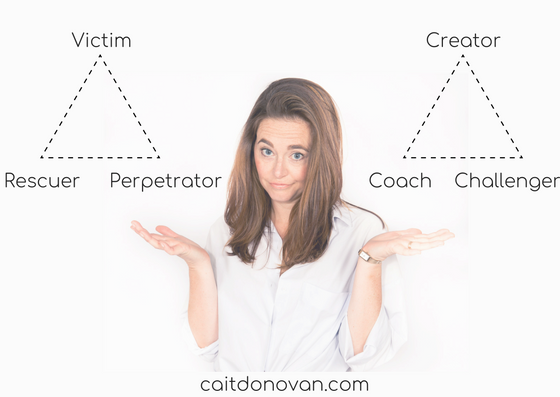Let’s set the scene:
Enter stage left. 3 women, one crying, another patting her back and a third with her back to the other two, arms folded over her chest, clearly annoyed.
Crying woman (VICTIM): Why does this always happen to me? I did everything she wanted! I wrote it as best as I could! I don’t even understand how it could be fixed!
Patting woman (RESCUER): Oh, Darling, here here, I have tissues, a shoulder to cry on, and a plan to get you feeling better! I’ll rewrite it for you!
Arms folded woman sighs loudly (PERPETRATOR): Oh dear lord. Reeeeeee-lax. This is not the end of the world, I simply let you know that the paper you wrote is not up to the standards that I need it to be. You can write it again.
The example above is an emotional one and is known as the Karpman drama triangle. Karpman described this in an article in 1968 and described how each of us bounces around from role to role, completely unaware throughout most of our life.
Sometimes, we are the victim (crying woman). Sometimes we are the rescuer (I’ll write it for you!) and sometimes we are the perpetrator (the jerk!). We all play all three roles at different times. Usually, we have one role that we play more than the others (I fall into being the rescuer often…).
Many people spend a lot of time in victim mode. You do this because it’s successful. There are plenty of rescuers out there that want to save you and when you’re able to put blame on a perpetrator, you don’t have to take any responsibility! It’s a lovely system!
Until it’s not.
In order for it to work, the people around you have to continue to fill the roles of rescuer and perpetrator. And if they’re working with me… they’ve probably started paying attention to that and might not be reacting the way you’re used to because it’s costing them way too much energy!
This system is exhausting because it leaves each of the roles without a true sense of personal responsibility which lead to not having a feeling of any sort of control. The victim has no responsibility (it’s NEVER their fault… or it’s OVERLY their fault, which is just as bad), the rescuer is taking responsibility for other people instead of for themselves, and the perpetrator is not taking responsibility for being a jerk.
So, everyone feels as if this is just the way things are and therefore have no way of having any influence over the situation and feel stuck. Which is tiring. No one likes to feel stuck.
Here’s the solution. We change the triangle from victim – rescuer – perpetrator to creator – challenger – coach. This is another tidbit that I learned from my fave, Martha Beck (I know, I know, I always talk about her… read her dang books already).
Here’s what it looks like, in the SAME situation, with a different triangle in play:
Enter stage left. 3 women, one with a sheet of paper in her hand, looking curious, another standing with her side by side, and a third facing both of them, in a calm stance.
Woman with sheet of paper (CREATOR): Ok, I got some feedback that this paper wasn’t up to snuff, but I cannot see exactly where I went wrong.
Woman beside her (COACH): Have you asked for specific examples of what you might be able to change for it to improve?
Woman facing them (CHALLENGER): I’m happy to give you the feedback you need. You’re a great writer, it’s just a few tweaks.
Which one feels better?
Take a minute. Read the first one again. Think about a situation in your life that you are having trouble with. What role are you in?
If you’re in victim mode, the questions you should ask yourself are:
What is one other viewpoint that I could put over this situation to make it look and feel different?
What are some examples of when I was in a similar situation but didn’t feel like a victim?
If you’re in rescuer mode, the questions you should ask yourself are:
Did this person ask for my help?
Am I doing this from desire or from my need to be a savior?
What is it that I need in this moment?
If you’re in perpetrator mode, here are your questions:
What if I’m wrong?
Is there a different scenario that could be at play here?
Is there someone who policed me the way I am policing others?
This is a huge topic for a singular post, but I hope it serves as a good introduction and helps you look at difficult scenarios in your life with new eyes. If, after these questions, you still feel justified in your role you are missing the point and it might be time for The Work of Byron Kate. I’m not going to save you here, you’ll have to google it and do The Work yourself. 😉


